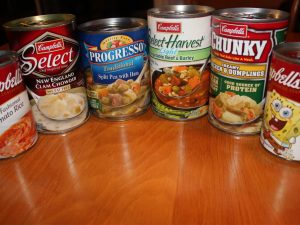 When we clear out our cupboards, there’s a good chance that we’ll find a canned soup tucked away at the back, most likely still in date and still potentially edible.
When we clear out our cupboards, there’s a good chance that we’ll find a canned soup tucked away at the back, most likely still in date and still potentially edible.
They’re a simple and tasty meal full of nutrition but when we dig deeper into what really goes into the production of canned soup, are the potential negative health impacts worth the consumption?
What’s in your canned soup that’s harmful?
Unfortunately, it’s proven that canned foods and a great deal of food and drink products on the market expose consumers to high levels of BPA.
But what is BPA and why is it bad for me?
Bisphenol A (BPA) is a chemical that has been used in the production of plastics and resins since the 1960’s, including the resin that is applied to the inside of canned food products, including soup.
Its detrimental health effects and according to the NRDC, include interrupted neural development and can even lead to asthma if children are exposed to large doses.
Are there any chemicals in my soup?
Sodium is a harmful chemical in large doses that is usually found in canned soup.
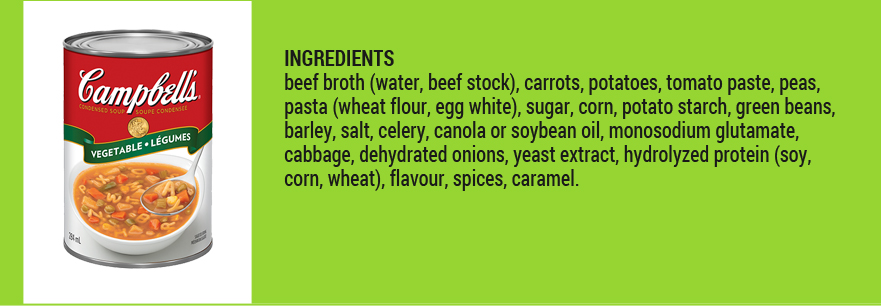 For example, Campbell’s soup can contain a whopping 1800mg of sodium, whereas our RDA is 2300 mg.
For example, Campbell’s soup can contain a whopping 1800mg of sodium, whereas our RDA is 2300 mg.
Sodium in our food is detrimental to our health in large doses because it can lead to heart disease, stroke, and even dementia.
While sodium is a chemical we can actively avoid, sometimes chemicals in our food can go unnoticed to the untrained eye.
Pesticides and GMO’s in our food can significantly affect our health, by carrying bacteria or viruses and subjecting us to particularly nasty chemicals including ammonia, benzene, and even formaldehyde.
What are GMO’s?
Genetically modified organisms are crops grown with certain genetic alterations to aid in the prevention of crop failure but usually use bacterial or viral genes to accomplish this.
Therefore, when GMO crops and pesticides are used within our food, we are potentially exposing ourselves to new strains of disease and chemicals that have detrimental impact on our body.
I’ve also heard that MSG is in a lot of food prod uce, but what is it?
In the production of soup, sometimes MSG (monosodium glutamate) is added as a flavor enhancer but even this can have catastrophic impacts on our bodies.
MSG symptom complex is a theoretical reaction that can cause headaches, heart palpitations, nausea, and numbness to the face and the recommended course of action is to avoid foods containing the substance.
Due to this indefinite and inconclusive research, MSG has to be listed on the label.
Unfortunately, some companies can maneuver around the labelling of this as MSG may not be directly added to your food.
MSG can hide under other names including gelatin, sodium, or stock. For a full list please visit Truth In Labelling.
Which Soups To Avoid & How To Prevent Contamination
Almost all of the supermarket canned soups contain one or more of the above ingredients, including the named brands:
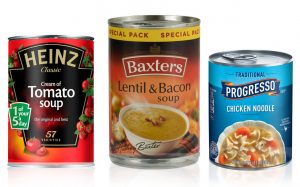
Heinz, Baxter’s, and Campbells. In addition to BPA and sodium, creamed soups can lead to high blood pressure. I.e Baxters Favourites Cream Of Tomato Soup has a third of your recommended salt allowance.
is another contender for worst soup on the market for your health.
It contains GMO soy, MSG, high sodium, and is contained in a BPA canned container.
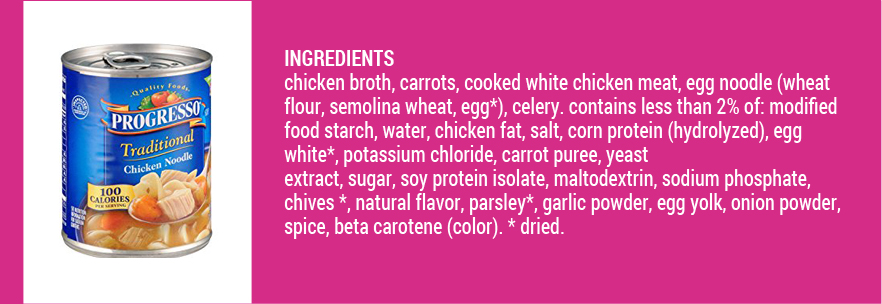 As well as these, Progresso contains allergens including milk, gluten, and egg which can be detrimental to those with food sensitivities.
As well as these, Progresso contains allergens including milk, gluten, and egg which can be detrimental to those with food sensitivities.
Where you can, we recommend avoiding canned foods and try using porcelain, glass, or BPA free containers instead although these are often few and far between.
Also look out for low sodium, GMO free, organic soups that also do not contain MSG.
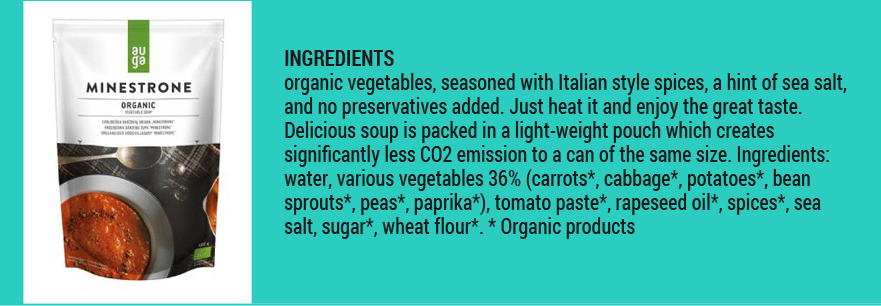 For example, Auga Organic Vegetable Minestrone soup is BPA free, organic, and ethical and has only 58 calories.
For example, Auga Organic Vegetable Minestrone soup is BPA free, organic, and ethical and has only 58 calories.
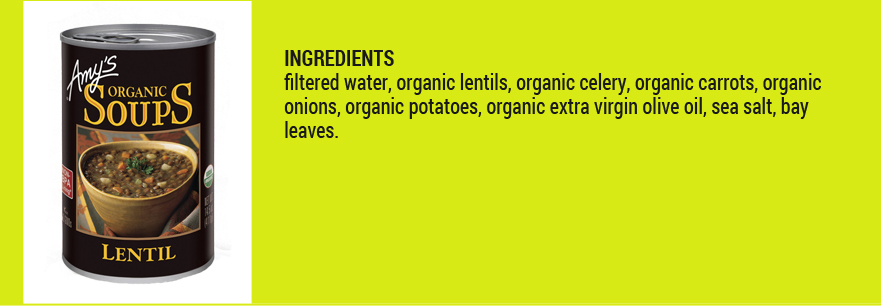 Amy’s organic soup is another brand that you may wish to try as they create a variety of flavours in BPA-free cans.
Amy’s organic soup is another brand that you may wish to try as they create a variety of flavours in BPA-free cans.
The company Ethos is to create pure, organic flavours using “100% pure herbs and spices (no hidden ingredients)”.
When we buy soups, we are never 100% sure as to what sinister ingredients aren’t being listed.
After all, if the FDA classify a substance as safe then it doesn’t need to be listed on our food labels and companies have become experts at hiding the ingredients that they don’t want us to see.
We would recommend looking for healthier options including those listed above which are low in sodium and fat if available and options that aren’t being subjected to BPA’s, pesticides, GMO’s and MSG.
To protect yourself from these toxic ingredients (which lead to higher risk of cancer), go to the next page and discover how to boost your immune system –
About the Author:
Emma Deangela is the best selling author of The Alkaline Diet Program and 80/20 Fat Loss. She has helped over tens of thousands of men and women to lose weight and transform their health with sound nutrition advice. Learn how you can lose weight fast – How to lose weight by adding these alkaline foods.
Do you buy canned soups? Do you look at their ingredients?
Please share with your friends this article on Canned Soups – Use any of the social media and email buttons on the left of our website.
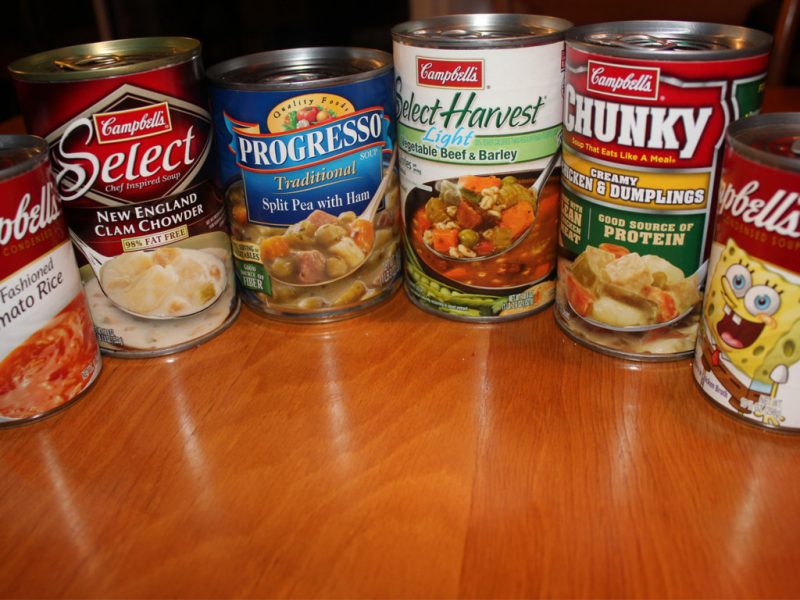

Leave a Reply